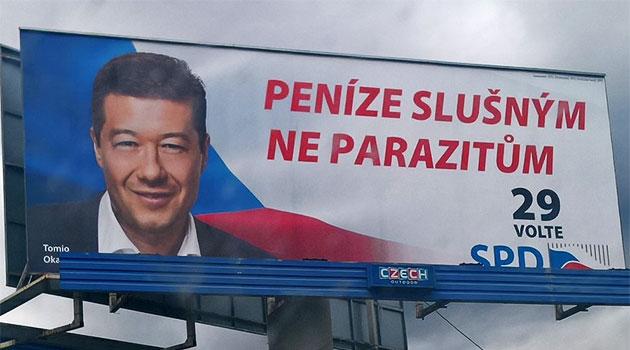Czech ultra-nationalist party joins local assembly in the country's second-largest city

The local assembly of the City of Brno will be joined for the first time ever by the populist, xenophobic “Freedom and Direct Democracy Movement of Tomio Okamura” (SPD), which won four of the 55 seats there in the recent elections. The lead candidate on that ticket, college instructor Ivan Fencl, told the Czech News Agency he wants to audit the city’s financial management and strategic projects as part of the opposition.
Brno’s local elections were won by ANO, followed by the Civic Democratic Party (ODS), the Christian Democrats (KDU-ČSL), the Pirates, the Czech Social Democratic Party (ČSSD) and lastly, the SPD. The Communist Party of Bohemia and Moravia (KSČM) and the previous coalition of the Green Party, “Live Brno” (Žít Brno) and TOP 09 all lost their assembly seats.
Okamura’s supporters won 5.07 % of the vote. “It was very tense, the results kept falling by hundredths of a percent,” Fencl described the final outcome.
“We were a bit nervous. We had hoped for five, six seats, but essentially we are satisfied that we will be raising our flag at City Hall,” the assembly member for the SPD said.
The SPD will most probably end up in opposition because the victorious ANO movement refuses to collaborate with them, as does the second-place ODS, although they do want to negotiate a broader coalition arrangement with anybody but the SPD. “We will be in opposition and we will contribute to auditing the city’s financial management and strategic projects,” Fencl said.
“We want action taken in the area of transportation and for the overview of road closures due to repairs to be transparent,” the SPD assembly member said. This year there were many traffic restrictions in Brno, with drivers of personal vehicles frequently stuck idling in traffic jams.
Most of the political parties said during the election that they consider local traffic management a problem. The SPD also said it intends to contribute to addressing residential parking, which has been a target of criticism.
“[Parking] needs to be dealt with in a more clever and fun way. We also want to be involved in auditing privatizations so City Hall behaves transparently vis-a- vis residents and does not privilege minorities at the expense of the majority,” Fencl said, referring to the fact that as part of its program to end homelessness, the city of Brno made municipally-owned apartment units available to 50 families with children who were in need of housing, many of them Romani.
The opposition criticized the program, alleging that the units were made available to persons who had previously defaulted on rents and who were housed sooner than ordinary housing applicants with better records as tenants. The local assembly is now divided as follows: ANO has 18 seats, ODS 14, the KDU-ČSL eight, the Pirates six, ČSSD five and the SPD four.
ANO and ODS alone can create a coalition with a majority of more than half the seats, but they have agreed that this is an opportunity to create an even broader coalition. The elections mark the first time since the 1989 Velvet Revolution that the KSČM did not earn more than 5 % of the vote in Brno and will therefore not be seated on the local assembly.
The ultra-right “Decent People” (Slušní lidé) party and the previous coalition of the Greens, “Live Brno” (Žít Brno) and TOP 09 also did not make into local government. Overall, the populist, xenophobic SPD won a total of 155 seats outright on local assemblies throughout the country.
The SPD also won another 15 seats running in coalition with other parties. A total of 4 500 people ran as SPD candidates.
